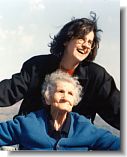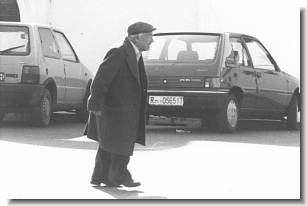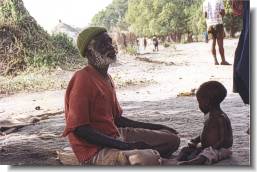|

by
Silvia Marangoni
|
The meaning
of old age
 Living a long life and a
happy old age remains the objective and hope for the great
majority of people. As the hopes for a longer
life increase, so also does the hope for an active
life. More and more elderly people remain healthy and are independent.
Old
age is not synonymous with dependency.
However, many of our contemporaries refuse to accept this period of
human life and they perceive it as a loss of all that that made
them happy them during their active life. The
lack of friendship, solidarity between the generations, distance from the relations also have
their origin in the erroneous image, full of prejudices and
stereotypes, which the public has
of old age. The conditions of many elderly
who are alone and abandoned say something about
the utilitarian orientation of our society. The elderly person
represents a great contemporary paradox: the gift
of a longer life is also
held by many to be useless and cumbersome. Just
on this topic, on the occasion of the International Year of
the Elderly, the Vatican, through the Papal Council of
the lay people, has produced an interesting
document that, emphasising the dignity of the elderly, helps
the contemporary man and woman to think about
the mission of the elderly in the Church
and in the world.
Living a long life and a
happy old age remains the objective and hope for the great
majority of people. As the hopes for a longer
life increase, so also does the hope for an active
life. More and more elderly people remain healthy and are independent.
Old
age is not synonymous with dependency.
However, many of our contemporaries refuse to accept this period of
human life and they perceive it as a loss of all that that made
them happy them during their active life. The
lack of friendship, solidarity between the generations, distance from the relations also have
their origin in the erroneous image, full of prejudices and
stereotypes, which the public has
of old age. The conditions of many elderly
who are alone and abandoned say something about
the utilitarian orientation of our society. The elderly person
represents a great contemporary paradox: the gift
of a longer life is also
held by many to be useless and cumbersome. Just
on this topic, on the occasion of the International Year of
the Elderly, the Vatican, through the Papal Council of
the lay people, has produced an interesting
document that, emphasising the dignity of the elderly, helps
the contemporary man and woman to think about
the mission of the elderly in the Church
and in the world.
 In effect our
society has lost the sense of old age.
The last discussion that gave meaning to old age was
that of the old sage who had truth
in a traditional society in which information and communication
was slow, but today the knowledge and abilities of the elderly does cannot compete with
rapid technological change. This is also occurring in other
areas of the planet where ancient traditions and archaic social
structures resisted. Let us think about the African Continent
and the
crisis of the elderly there, where up to now the elderly
had benefited from the attention and protection proximity
of their next-of-kin, relatives, clan, and local community. Today in
these areas it also becomes more difficult to preserve
such relations at a time when the number of elderly it
growing and, at the same
time, because of the emigration and of
the urbanisation, the traditional structures such as the extended
family, have undergone radical changes. In effect our
society has lost the sense of old age.
The last discussion that gave meaning to old age was
that of the old sage who had truth
in a traditional society in which information and communication
was slow, but today the knowledge and abilities of the elderly does cannot compete with
rapid technological change. This is also occurring in other
areas of the planet where ancient traditions and archaic social
structures resisted. Let us think about the African Continent
and the
crisis of the elderly there, where up to now the elderly
had benefited from the attention and protection proximity
of their next-of-kin, relatives, clan, and local community. Today in
these areas it also becomes more difficult to preserve
such relations at a time when the number of elderly it
growing and, at the same
time, because of the emigration and of
the urbanisation, the traditional structures such as the extended
family, have undergone radical changes.
Therefore, for who those who are growing older,
comes an age in which they are able to do less, in which his or
her ways of thinking or doing are out-dated, an age in which
fragility of not being able to keep up with a competitive world
emerges.
The old questions of many adults
and young people emerge in this critical social context: how to react to old
age, how to avoid becoming citizens of the elderly �continent�, how not to lose consideration
and power among the healthy, the young and the strong? It is
better to stay younger as long as possible, to defend one�s own
youthfulness.
 Being
old is a value negative. It is thus
necessary to help the contemporary man, the old person of
today and tomorrow, to rediscover the meaning of life beyond their productive consumerist
life. The elderly with their fragility, their weakness are an
forceful question about the meaning of life that goes far
beyond that attributed by the market and competitiveness. Meeting the
elderly means discovering in them a great
desire to live. To defeat
the current negative representation of old age
is first of all a cultural and educational
undertaking that must involve all generations. There is a responsibility towards the elderly of today that are
helped to accept their age appreciating it�s resources and defeating
their withdrawal from society, the painful feelings of uselessness, the
desperation and the anger towards new generations. There is also
a responsibility towards the future generations: that of preparing a more favourable
environment for the
condition of old age. The impoverishment of relations affects
all of society, but in more obvious ways the
elderly. The well-being, the social justice, the fairness, the
centrality of the human person, his dignity, the fraternal
sharing must be pursued in order to prevent
the culture of indifference, the
exasperated individualism, the competitiveness and the utilitarianism
that threaten all areas of humanity.
Being
old is a value negative. It is thus
necessary to help the contemporary man, the old person of
today and tomorrow, to rediscover the meaning of life beyond their productive consumerist
life. The elderly with their fragility, their weakness are an
forceful question about the meaning of life that goes far
beyond that attributed by the market and competitiveness. Meeting the
elderly means discovering in them a great
desire to live. To defeat
the current negative representation of old age
is first of all a cultural and educational
undertaking that must involve all generations. There is a responsibility towards the elderly of today that are
helped to accept their age appreciating it�s resources and defeating
their withdrawal from society, the painful feelings of uselessness, the
desperation and the anger towards new generations. There is also
a responsibility towards the future generations: that of preparing a more favourable
environment for the
condition of old age. The impoverishment of relations affects
all of society, but in more obvious ways the
elderly. The well-being, the social justice, the fairness, the
centrality of the human person, his dignity, the fraternal
sharing must be pursued in order to prevent
the culture of indifference, the
exasperated individualism, the competitiveness and the utilitarianism
that threaten all areas of humanity.
|
